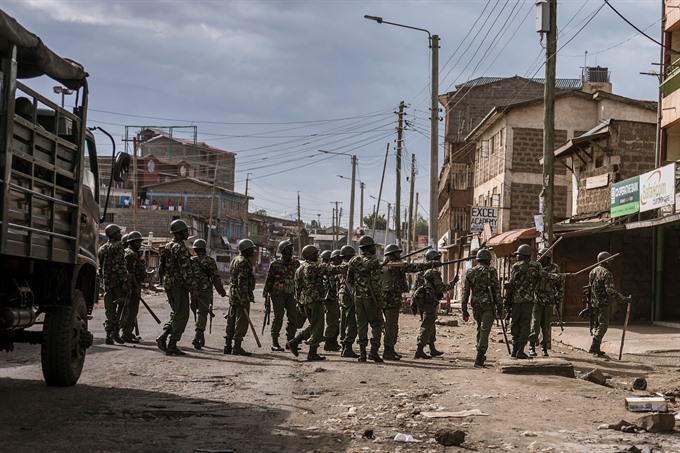 World
World

Kenya's election board remained silent Sunday over plans to reschedule a vote in flashpoint opposition areas, where a boycott sparked violent protests in a poll set to hand President Uhuru Kenyatta a landslide, but tarnished, win.
 |
| Officers of the Kenyan General Service Unit (GSU), a paramilitary unit of the National Police Service of Kenya, patrol in the streets of the Kawangware slum in Nairobi on Sunday. - AFP/VNA Photo |
NAIROBI — Kenya’s election board remained silent Sunday over plans to reschedule a vote in flashpoint opposition areas, where a boycott sparked violent protests in a poll set to hand President Uhuru Kenyatta a landslide, but tarnished, win.
With the counting almost done after Thursday’s presidential re-run, the results remained on hold as officials mulled what to do about 25 constituencies in four western counties where voting was blocked.
There, supporters of opposition leader Raila Odinga managed to prevent hundreds of polling stations from opening, prompting violent clashes with police which continued for several days, leaving nine dead and scores injured.
At least 49 people have died since the first presidential election of August 8, which was later overturned, prompting Kenya’s worst political crisis in a decade.
Following Odinga’s boycott, Kenyatta is almost guaranteed a crushing win.
But it was looking ever more like a Pyhrric victory with low turnout figures likely to tarnish the credibility of a vote that has deeply polarized the nation and sparked international concern about the future of east Africa’s most stable democracy.
In a televised address, election chief Wafula Chebukati gave updated figures, saying that in 251 of the 266 constituencies where voting actually took place, some 7.4 million people showed up to cast their ballots.
The figure equates to a turnout of around 43 per cent.
Including the diaspora, Kenya has a total of 291 constituencies, but the vote did not happen in 25 of them.
Although Chebukati had said he would address the question of a re-run in protest-hit western areas, he made no comment on the matter, pledging only to give a fresh update on Monday morning.
"On 8 August, the commission thought we had done the best election ever but here we are now, and I want to assure you that what we are doing here... is being done properly in a free and fair environment," he said.
"I can confidently say that I’m satisfied with this process."
’No Raila, no peace!’
Plans to restage the vote in the western regions on Saturday were quickly called off after a second day of protests over fears for the safety of polling staff.
Odinga, who earlier showed up for church in Nairobi’s protest-hit Kawangware slum, has demanded a new election within 90 days, vowing to stage a campaign of "civil disobedience".
"No Raila, no peace!" chanted the large crowd which had gathered to hear him speak, some of whom had marched over from Kibera, another of the city’s poorest districts.
"We are telling (Kenyatta)... the people of Kenya will not be ruled by the gun," he said in Swahili, to whistles and cheers. "You cannot kill people because they did not vote."
But William Ruto, Kenyatta’s deputy, ridiculed Odinga’s demand for a fresh poll.
"There will be no election in 90 days, there will be no discussion on matters to do with elections. We will have dialogue with Mr. Odinga on other matters, not matters that have been settled by people of Kenya in their supreme will in a ballot," he told Doha-based broadcaster Al-Jazeera.
Thursday’s presidential re-run was ordered by Kenya’s Supreme Court after it overturned Kenyatta’s August victory over "irregularities" in the transmission of votes.
’No winners’
"None of the questions raised by the Supreme Court’s nullification of the original vote were answered by the election," wrote Nic Cheeseman, an expert on African politics at Birmingham University in central England.
And although the official results were likely to notch up a landslide for Kenyatta, "the low turnout and the circumstances surrounding the polls means that his government has gained little."
"Given all this, it is hard to avoid the conclusion that this was an election in which there were no winners," Cheeseman wrote in Kenya’s Daily Nation newspaper.
While the Supreme Court ruling was hailed as a chance to deepen democracy, the acrimonious bickering between Odinga and Kenyatta -- whose fathers were rivals before them -- has sharply divided a country where politics is polarized along tribal lines.
Kenya’s political crisis is the worst since a 2007 vote sparked months of politically-driven ethnic violence that left 1,100 people dead.
While the dynamics of 2017’s political crisis are very different, the memory of the bloodshed a decade ago is never far away. — AFP




